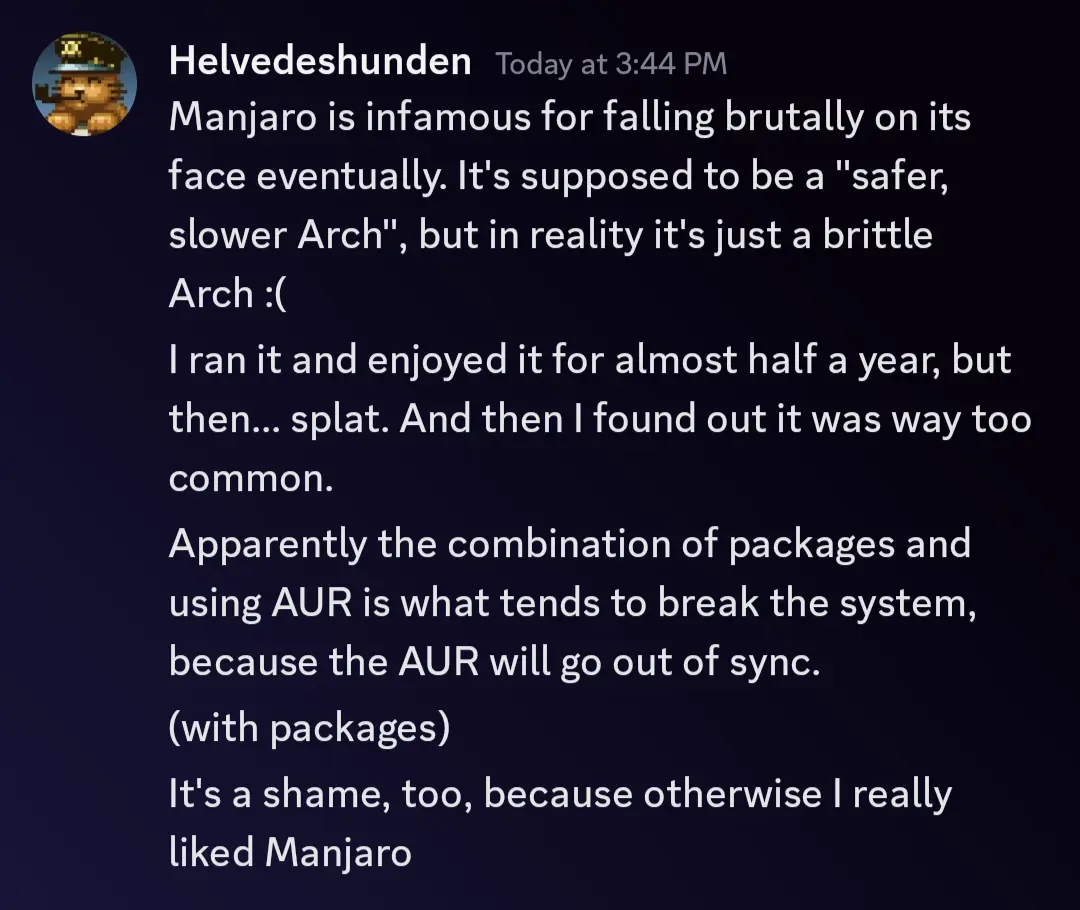So... using Manjaro without using the AUR is fine?
Linux
From Wikipedia, the free encyclopedia
Linux is a family of open source Unix-like operating systems based on the Linux kernel, an operating system kernel first released on September 17, 1991 by Linus Torvalds. Linux is typically packaged in a Linux distribution (or distro for short).
Distributions include the Linux kernel and supporting system software and libraries, many of which are provided by the GNU Project. Many Linux distributions use the word "Linux" in their name, but the Free Software Foundation uses the name GNU/Linux to emphasize the importance of GNU software, causing some controversy.
Rules
- Posts must be relevant to operating systems running the Linux kernel. GNU/Linux or otherwise.
- No misinformation
- No NSFW content
- No hate speech, bigotry, etc
Related Communities
Community icon by Alpár-Etele Méder, licensed under CC BY 3.0
Yes*. Unless of course the Manjaro makes some dumb mistake as they have regularly historically. There is nothing wrong with it by design though if you avoid the AUR.
A lot of the “working for years” comments here look like folks who only use the Manjaro repos.
You should try Crystal Linux, it's Arch based, and it has the easiest installer ever.
I've heard that Manjaro is a "bad OS", but I've been using it for a few years and haven't had any issues with it. As a noob, though, is probably avoid most Arch distros, though. They're not impossible or anything, but they can be intimidating and may leave a bad taste of Linux in your mouth if they're not set up right. I do like Fedora quite a bit. It and OpenSuse are my dailys. Mint was my go-to for years, and I would still highly recommend it for beginners. (E) Mint is a deb based distro.
I have been running CachyOs for some months and I really like it, it is a clean and fast distro based on arch with many DE. You could give it a try on a live usb at least.
I've been using Manjaro for 5+ years with no problem. Manjaro is a rolling distro, and unfortunately there is not enough volunteers in open source community to maintain a bleeding edge rolling distribution that is completely bug free. It is just a matter of personal preference how close to bleeding edge do you want your system to be between Arch, Manjaro, Endeavor, and OpenSUSE. I found that Manjaro is quite useful to have because I run non-FOSS programs like Dropbox, Zotero, MegaSYNC, and MATLAB.
One tips I have is that don't bother to update every other week. There are plenty literal supercomputers running on outdated Linux OS or stable distro releases like Fedora. Linux by default is already more secure. Just because there are updates available doesn't mean one should do it, unless you need the bleeding edge updates due to your line of work. I thought we install Linux to run away from annoying Windows updates. If you update Manjaro like every 6 months or so, it is pretty unlikely (statistically) that you get a bad update.
If you want to go back to something based on debian, consider PopOS!
